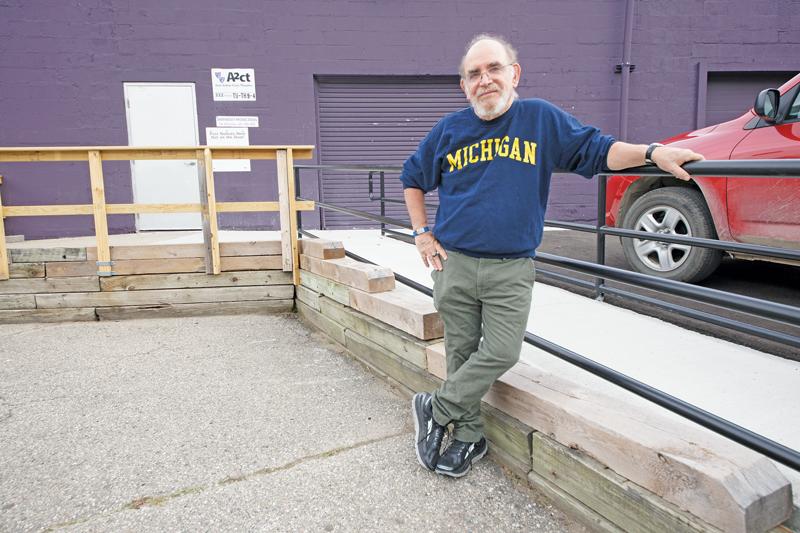One night, win the spring of 2017, I walked off a railing-less ramp and fell face first onto the parking lot at the Ann Arbor Civic Theatre. I didn’t realize at the time–indeed, not fully until a few months later–that I had also fallen through the looking glass.
When the ambulance team wheeled me into the emergency room, they described my injury as a “face plant.” I found that vaguely amusing, as did my wife, an avid gardener. It was also comforting because, if I had planted my face a bit further north of nose, or if my head had been turned slightly differently, I would have either broken my neck or fractured my skull. Under those circumstances, I would have been planted indeed–eternally potted or interred.
As it was, I was left with a multiply fractured nose, a row of front teeth that reminded me of the Tiger Stadium’s last days, and what I called my reverse Hitler moustache: The part under my nose was entirely scraped away. The wings on each side remained.
Once I was functioning again, I wondered whether anyone had ever inspected this railing-less ramp. I called the city, which sent out a building inspector. The exterior was found to be in violation of several codes, including the lack of railing and the ramp’s degree of slope. An “enforcement” (their term) was initiated, and the ramp has since been entirely rebuilt.
It is quite lovely. A long metal railing now extends to the bottom and even a bit beyond, and a bright colored surface now distinguishes the ramp from the parking lot (previously, they were identical). Had the new ramp been there on the night I walked off it, I could not have walked off it.
Putting my face back together cost me about $10,000, mostly for dental work. I assumed the building owner would have insurance that would help me with that. Some friends suggested I might want to consult a lawyer, so I did what all true Michiganders are supposed to do under such circumstances: I called Sam.
I was not anticipating a lawsuit, but I thought at least some general advice might help. And I had some acquaintance with others in the Bernstein family. An associate answered my call, and I explained what had happened.
The next day, to my great surprise, Sam called me. However, what he had to tell me was that I was out of luck. Under Michigan’s “premises liability” law, it is almost impossible to be awarded compensation in a case like mine.
My face plant had landed me in a legal Wonderland. As Sam explained–and I was to hear from other lawyers–Michigan goes by what, in common law, is called the “open and obvious” doctrine. “Open and obvious” means that if an average person could be expected to anticipate whatever hazard might be present, the owner of the hazardous premises is almost never held accountable.
For example, if one falls on black ice in winter, an average person would know black ice happens, even if it can’t be seen. And whoever owned the property would not be responsible (unless, and even here things are not entirely clear, they deliberately black-iced their front porch just before the arrival of in-laws whom they especially disliked–but that probably falls under assault rather than premises liability).
There’s more. Sam explained that the assessment of whether a hazard is “open and obvious” has been judged, by our conservative Michigan Supreme Court, to be the objective condition of the property, and unrelated to the situation of the injured person. Thus, if a legally blind person fell on ice, the fact that they could not have seen the slippery stuff is irrelevant, even if the property owner knew the conditions and that the legally blind person was coming for dinner. Ice is not a forty-foot-deep pit trap concealed by a welcome mat. It is a natural part of the chilly world we’re in, whether we happen to be blind or blind drunk or simply high on life.
The forty-foot pit trap was not an arbitrary example. In their efforts to clarify when a property owner might be held liable, our Supreme Court has outlined two conditions which could apply, usually in tandem. First, the reasonable person had no choice but to proceed along the path that led to their misfortune (as opposed to turning around and going home, which has actually prevailed as a liability-killing argument in some cases). Second, the property owner had to be grossly negligent in setting or leaving hazards on the road inexorably traveled by.
So, in practice, it comes down to something like this: If the hypothetical reasonable person were fleeing a burning building by the only exit available to them (“only exit” matters), and the building owner had knowingly dug a pit, loosed some rabid dogs, or planted land mines along the exit route, then that owner might be held accountable–although in our state, even then there are no guarantees.
Such is the Wonderland of premises liability law in Michigan. Some of this I learned from Sam. Some I learned from other lawyers with whom I spoke. And I did find a wonderful young lawyer who was willing to help as he could, while advising me not to expect much redress. And, indeed, the insurance company for the building owner has offered, as of this date, absolutely nothing. Even my realistic young lawyer has been outraged.
Meanwhile, my moustache has returned. I am not John Bolton (thank the Lord), but I am not the tire inside the Red Wings logo either. The fragments of my nose have fused together and mostly resemble the nose that was. My new upper teeth, now all bridge, would be comfortable sitting together in a lower box at Comerica Park. And, most important, there is now a new ramp, and a railing, that will protect reasonable people like myself from future face plantings.
We can plant tomatoes instead.
